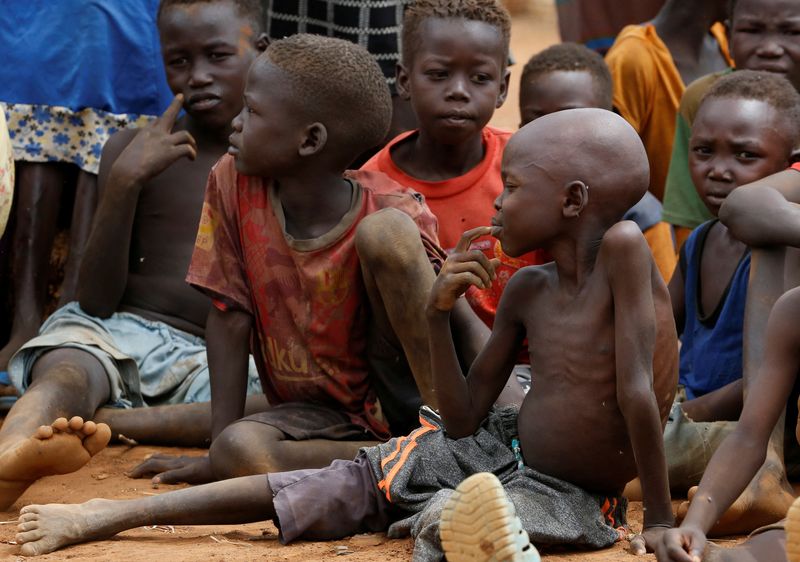By Aidan Lewis
(Reuters) -A conflict in Sudan that erupted in April 2023 has unleashed waves of ethnic violence, created the world's largest internal displacement crisis, and pushed at least one area in Darfur into famine.
WHAT TRIGGERED THE VIOLENCE?
Tensions had been building for months before fighting between Sudan's army and the paramilitary Rapid Support Forces (RSF) erupted in the capital Khartoum on April 15, 2023.
The army and RSF had been in a fragile partnership after staging a coup in October 2021, which derailed a transition from the rule of Islamist autocrat Omar al-Bashir. Bashir was ousted in 2019.
The two sides clashed over an internationally backed plan that would have launched a new transition with civilian parties and required the army and the RSF to cede powers.
Specific points of dispute were the timetable for the RSF to be integrated into the regular armed forces, the chain of command between the army and RSF leaders, and the question of civilian oversight.
The warring parties had also been in competition over sprawling business interests, which they were seeking to protect.
WHO ARE THE MAIN PLAYERS?
Protagonists in the power struggle are General Abdel Fattah al-Burhan, head of the army and leader of Sudan's ruling council since 2019, and his former deputy on the council, RSF leader General Mohamed Hamdan Dagalo, known as Hemedti.
Hemedti, who grew wealthy through gold mining and other ventures, leads the RSF. Members of his family and clan play prominent roles and the force's power base is the western region of Darfur, where the RSF emerged from militias fighting alongside government troops to crush rebels in a brutal war that escalated after 2003.
Analysts say Burhan's position is less assured at the head of the army, where Islamist-leaning Bashir loyalists and veterans have gained sway since the 2021 coup.
The RSF says it is fighting to rid Sudan of remnants of Bashir's regime, while the army says it is trying to protect the state against "criminal" rebels.
Witnesses say the RSF and its allies have committed extensive abuses including ethnically targeted killings, sexual violence and looting. Residents have accused the army of killing civilians in indiscriminate shelling and air strikes. Both sides have largely denied the accusations against them.
WHO'S WINNING?
Though Sudan's army started the war with superior resources, including air power, the RSF was officially recognised in 2017 and had grown in recent years into a well-equipped force deployed around Sudan.
In the first days of the war, the RSF's more nimble units embedded in neighbourhoods across the capital. Towards the end of 2023, the RSF made rapid advances to consolidate its grip on Darfur and take over El Gezira state south of Khartoum, a key agricultural area.
The army regained some footing with advances in March in Omdurman, one of the three cities that make up the wider capital, but the RSF later pushed forward again into Sennar, White Nile and Gedaref states.
The battle has recently deepened around the army holdout of al-Fashir in North Darfur, while the army has made a new push to regain ground in the capital.
WHAT'S AT STAKE?
The uprising that led to Bashir's overthrow raised hopes that Sudan and its population of about 50 million could emerge from decades of autocracy, internal conflict and economic isolation.
But more than 17 months of war have inflicted massive damage on infrastructure, forced more than 10 million people from their homes and left half the population facing crisis levels of hunger. On Aug. 1, experts announced that famine was ongoing in one area in Darfur and that there was a risk of famine in 13 other areas.
Homes, offices, warehouses and banks have been looted, hospitals put out of service and trade and farming disrupted. Tens of thousands have been killed - estimates are uncertain - and both sides have been accused of war crimes.
Aid agencies say fighting, looting and bureaucracy have hampered relief deliveries.
Intensified political and ethnic rivalries within Sudan have led to fears that the country, Africa's third largest by area, could splinter, destabilising a volatile region bordering the Sahel, the Red Sea and the Horn of Africa.
Hundreds of thousands of people have fled to Egypt, Chad and South Sudan, with smaller numbers crossing into Ethiopia and the Central African Republic.
Both sides in the conflict have used gold, Sudan's most valuable and widely smuggled resource, to support their war effort.
WHAT'S THE ROLE OF FOREIGN STATES?
The conflict has played into competition for influence in Sudan and the surrounding region among powers including the United Arab Emirates, Saudi Arabia, Egypt, Ethiopia, Iran and Russia.
Gulf states have previously pursued investments in sectors including agriculture and ports. Russia has been seeking a naval base on Sudan's coast.
The UAE has provided arms to the RSF, according to U.N. experts, while sources say Iran has flown in military support for the army.
Egypt and its President Abdel Fattah al-Sisi, a former army chief who overthrew his Islamist predecessor, have deep ties to Burhan and the army.
Western powers, including the United States, swung behind the transition following Bashir's overthrow, but diplomatic attention on Sudan has been limited by the wars in Ukraine and Gaza.
WHAT EFFORTS HAVE BEEN MADE TO END THE WAR?
Last year Saudi Arabia and the United States brought delegations from both factions to Jeddah for talks, but the ceasefires agreed there never stuck and the process faltered.
Other initiatives have been launched by African regional grouping IGAD and by Egypt, leading to concern about overlapping diplomatic efforts and rivalry.

In August the U.S. convened talks in Switzerland, but they were undermined by the absence of the army.
The RSF has said it is open to a ceasefire while continuing to assault al-Fashir. The army says peace is only possible if its rivals lay down their arms and withdraw.